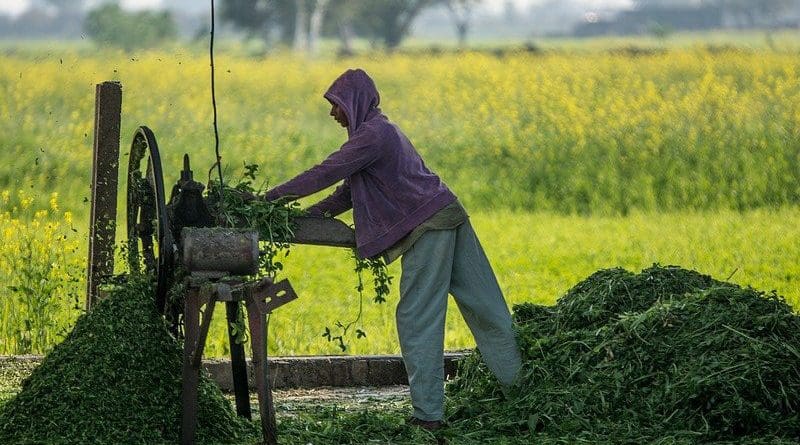Climate Change: A Threat To Pakistan’s Agrarian Economy – OpEd
Climate change poses a significant and multifaceted threat to Pakistan, with profound implications for its agrarian society and economy. The country’s heavy reliance on agriculture as a primary economic sector makes it particularly vulnerable to the adverse impacts of climate change. This article explores the various dimensions of this threat, examining the direct and indirect consequences on agriculture, rural communities, and the broader concept of food security.
Pakistan’s agriculture sector is highly susceptible to the impacts of climate change. Rising temperatures, altered precipitation patterns, and extreme weather disrupt traditional farming practices. Changes in the schedule and intensity of rainfall affect crop cycles, leading to reduced yields and increased uncertainty for farmers. Prolonged droughts, heatwaves, and floods further exacerbate the challenges, threatening the livelihoods of those dependent on agriculture.
One of the critical challenges of climate change in Pakistan is the increasing water scarcity. The country heavily relies on the Indus River for irrigation, and precipitation patterns and glacial melt alterations have significant implications for water availability. Pakistan is ranked 160th in the water withdrawal resources ratio, and agriculture sector is the largest water consumer sector, accounting for 94 percent of annual water withdrawal.
Climate change disrupts the suitability of certain regions for specific crops, affecting crop diversity and productivity. Pakistan is on the verge of severe food insecurity. Additionally, shifts in temperature and precipitation patterns influence the availability and quality of fodder for livestock. This sudden change in temperature, in turn, threatens the livelihoods of farmers who depend on crops and livestock for their income, eventually hitting the food availability in Pakistan.
The agrarian society of Pakistan is predominantly rural, and most of the population relies on agriculture for its livelihood. Climate change-induced disruptions in farming practices directly affect the income and well-being of rural communities. As crop yields decline and water scarcity increases, farmers face economic challenges, often leading to heightened poverty levels and migration from rural areas.
The interconnectedness of climate change and agriculture raises significant concerns about food security in Pakistan. Reduced crop yields, disruptions in the supply chain, and increased food prices can lead to inadequate access to nutrition for vulnerable populations. Addressing these challenges requires short-term solutions and long-term strategies to enhance the resilience of the agricultural sector.
The Pakistani government recognizes the severity of the threats posed by climate change to the food sector and has implemented policies aimed at adaptation and mitigation. In 2022, Pakistan Tehreek-e-Insaf’s Senator Dr. Sania Nishtar proposed a draft resolution targeting this threatening trend of rising food insecurity. In 2018, the National Food Security Policy (NFSP) was formulated by the then newly established government of PTI in order to control the rising threat of food shortage. However, it still needs a unified action plan to streamline and consolidate all efforts toward ensuring adequate mechanisms and facilities for food shortages.
In 2021, Pakistan’s National Climate Change Policy (NCCP) was updated to address the challenges of climate change and promote sustainable development. The policy focuses on adaptation and mitigation strategies to address the impacts of climate change. The policy proposes conducting comprehensive vulnerability and risk assessments to identify the areas and sectors most vulnerable to climate change impacts. It focuses on promoting the integration of climate change considerations into various sectors, including agriculture, water resources, energy, health, and infrastructure. Recognizing that climate change is a global issue, the policy underscores the importance of international cooperation. It emphasizes collaboration with the international community to effectively access funds, technology, and expertise to address climate change challenges. There is a need for capacity building at various levels, including government institutions, communities, and the private sector. Garnering public support and participation, the policy stresses the importance of raising awareness about climate change and its impacts. Educational programs are essential to build a sense of responsibility and promote sustainable practices. The development and utilization of renewable energy sources to reduce dependence on fossil fuels, decrease greenhouse gas emissions, and promote a more sustainable energy sector. It is important as per the policy to conserve natural resources, including water and biodiversity, to enhance resilience to climate change and promote sustainable development.
However, effective implementation, resource allocation, and monitoring mechanisms are crucial for the success of these initiatives. International cooperation is also imperative to access funds, technology, and expertise to strengthen the country’s resilience against climate change impacts, particularly in the food sector, which is quite vulnerable currently.
In the face of climate change, technological advancements and innovative agricultural practices play a pivotal role. Sustainable agricultural practices, precision farming, and adopting climate-resilient crop varieties can contribute to building the adaptive capacity of the agricultural sector.
Climate change undeniably presents a formidable threat to Pakistan’s agrarian society and economy. The multifaceted challenges—from altered precipitation patterns to water scarcity—require a comprehensive and coordinated response. Sustainable agricultural practices, community engagement, government policies, and international collaboration are vital components of a resilient strategy. As Pakistan navigates the complex interplay between climate change and its agricultural economy, proactive and adaptive measures are essential to ensure the nation’s sustainable and secure future.

